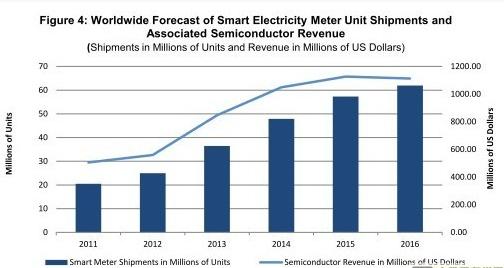Due to the advantages of energy conservation and improvement of grid efficiency, it is expected that power companies will rapidly adopt smart meters to boost global shipments from 2011 to 2016 and double the associated semiconductor market.
According to IHSiSuppli, global smart meter shipments in 2016 will increase from 20.5 million in 2011 to 62 million. In 2016, the sales of semiconductors used in global smart meters will increase from 505.6 million US dollars in 2011 to 1.1 billion US dollars. The chart below shows IHSiSuppli's forecast for global smart meter shipments and related semiconductor sales.

The original intention of using smart meters instead of traditional ones is to save energy. However, it is more attractive to introduce smart grids. By adopting smart meters, power companies will eventually form a well-planned power grid that will enable them to plan their power generation capabilities and manage their resources more effectively.
Government support measures and regulations are promoting the deployment of smart meters. For example, in the United States, the stimulus funds provided by the SmartGridInvestmentGrantProgram are driving the replacement of smart meters with traditional electricity meters. At the same time, the European Union plans to convert 80% of its electricity meters into smart meters by 2020, with shipments equivalent to 180 million.
Smartly promote smart meters
Despite these favorable factors, and smart meter shipments will grow rapidly in the next few years, the actual deployment is much slower than expected a few years ago.
One factor that inhibits this market growth is the lack of money. In the current economic situation, investments in smart grids and smart meters are below expectations in many aspects.
Another factor is consumer acceptance of smart meters. Individual deployment of smart meters may not be enough to convince consumers that it is worth installing these meters. Instead, it should be equipped with appropriate services to provide consumers with more value, such as dashboards that can show the power consumption of appliances such as home appliances.
Combining smart meters with smart home functionality may be an excellent opportunity for telecom companies. Selling devices that support these features will create additional semiconductor sales.
Smart meter smart chip
The smart meter market is thriving and will boost the rise of a large number of related semiconductor businesses. Semiconductors that account for the largest part of smart meter costs are logic integrated circuits (ICs) such as microcontrollers, digital signal processors, and microprocessors.
Smart meters are increasingly using system-on-chip (SOC) devices to integrate most functions on one device.
Although the smart meter semiconductor market will grow in the next few years, sales growth will be at a standstill since 2015. Extensive use of SOC will accelerate the downward trend in prices, leading to overall sales stagnation from 2015, although smart meter shipments will continue to grow.
led strip lights ,custom led signs,light fixtures,landscape lighting
HSONG LIGHTING CO,. LTD , https://www.lightingforproject.com